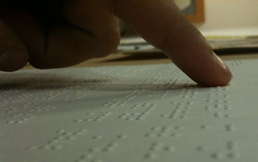Podcast for 13 May 2011 – Neuropsychology
Researchers erase sea snail memories, the brain's sarcasm detector, why a lack of embarrassment could be a sign of dementia, and schizophrenia in a petri dish.


Researchers erase sea snail memories, the brain's sarcasm detector, why a lack of embarrassment could be a sign of dementia, and schizophrenia in a petri dish.
A new study links a failing sense of irony to a form of early-onset dementia.
Autistic people use their brains differently than non-autistics when processing visual information.
Children’s brains grow very rapidly, and now scientists are finding that adult brains can grow quickly, too.
New research lets people with severe disabilities rapidly switch between different communication and assistive devices.

Justice and lunch breaks, autism and visual processing, a case of beat deafness, and the hormone of smell.

Football and family violence, rooting out insects, a question of taste, and a bird's eye view for danger.

A new generation of self-conscious robots, how sunshine affects drugs in the body, new research into the prevention of cleft lips, why it's hard to stay focused for long periods of time, and what sound recordings can tell us about the health of natural habitats.
EEG brain scans may someday allow doctors to identify – and treat – babies at risk for autism.
The same area of the brain is activated whether you’re a blind person reading Braille with your hands or a sighted person reading with your eyes.

The surprising way the brain processes Braille, bilingualism staves off dementia, and new research on stuttering. Also: why being lonely could change how your immune system works, and the relationship between popularity and bullying.
Speaking a second language may slow down the cognitive decline of Alzheimer’s disease.

ANNUAL MEETING SPECIAL: The new science of aeroecology, deconstructing taste preferences, new ways to store energy, and 3-D printers that could one day produce replacement organs.

BRAIN SCIENCE: How the brain chooses which memories to store during sleep, neural explanations for ringing in the ears, and the brain rewards of listening to music.

Left-handers suffer more from learning disabilities but can also excel in spatial visualization.
Scientists have erased learning and memory deficits in a mouse model of early Alzheimer's disease.
Researchers are studying a woman who lacks fear in order to help those suffering from post-traumatic stress disorder.
Being born in the winter could affect your biological clock – and your personality – later in life.
